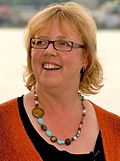2011 Canadian federal election in Quebec
| |||||||||||||||||||||||||||||||||||||||||||||||||||||||||||||||||||||||||||||||||||||||||
All 75 Quebec seats in the House of Commons of Canada | |||||||||||||||||||||||||||||||||||||||||||||||||||||||||||||||||||||||||||||||||||||||||
|---|---|---|---|---|---|---|---|---|---|---|---|---|---|---|---|---|---|---|---|---|---|---|---|---|---|---|---|---|---|---|---|---|---|---|---|---|---|---|---|---|---|---|---|---|---|---|---|---|---|---|---|---|---|---|---|---|---|---|---|---|---|---|---|---|---|---|---|---|---|---|---|---|---|---|---|---|---|---|---|---|---|---|---|---|---|---|---|---|---|
| Opinion polls | |||||||||||||||||||||||||||||||||||||||||||||||||||||||||||||||||||||||||||||||||||||||||
| Registered | 6,130,307 | ||||||||||||||||||||||||||||||||||||||||||||||||||||||||||||||||||||||||||||||||||||||||
| Turnout | 3,801,690 (62%) [1] | ||||||||||||||||||||||||||||||||||||||||||||||||||||||||||||||||||||||||||||||||||||||||
| |||||||||||||||||||||||||||||||||||||||||||||||||||||||||||||||||||||||||||||||||||||||||
| |||||||||||||||||||||||||||||||||||||||||||||||||||||||||||||||||||||||||||||||||||||||||
In the 2011 Canadian federal election, there were 75 members of Parliament elected to the House of Commons from the province of Quebec, making up 24.4% of all members of the House.
Background
[edit]Timeline
[edit]| Seat | Before | Change | |||||
|---|---|---|---|---|---|---|---|
| Date | Member | Party | Reason | Date | Member | Party | |
| Montmagny—L'Islet—Kamouraska—Rivière-du-Loup | May 21, 2009 | Paul Crête | █ Bloc Québécois | Resigned to run in provincial Rivière-du-Loup by-election. | November 9, 2009 | Bernard Généreux | █ Conservative |
| Hochelaga | September 16, 2009 | Réal Ménard | █ Bloc Québécois | Resigned to run in Montreal municipal election. | November 9, 2009 | Daniel Paillé | █ Bloc Québécois |
| Haute-Gaspésie—La Mitis—Matane—Matapédia | October 22, 2010 | Jean-Yves Roy | █ Bloc Québécois | Resigned due to health issues | █ Vacant | ||
Opinion Polling
[edit]Predictions
[edit]

Results
[edit]Summary
[edit]| Party | Votes | Vote % | Vote +/- | Seats | Seat +/- | |
|---|---|---|---|---|---|---|
| New Democratic | 1 630 865 | 59 / 75 (79%)
|
||||
| Liberal | 538 447 | 7 / 75 (9%)
|
||||
| Conservative | 627 961 | 5 / 75 (7%)
|
||||
| Bloc Québécois | 891 425 | 4 / 75 (5%)
|
||||
| Green | 80 402 | 0 / 75 (0%)
|
||||
| Independent | 23,819 | pp | 0 / 75 (0%)
|
|||
| Other | 8,771 | pp | 0 / 75 (0%)
|
|||
| Total | 3,801,690 | – | 75 / 75 (100%)
|
|||
Comparison with national results
[edit]| Party | Popular vote % | Seats in caucus | |||
|---|---|---|---|---|---|
| QC | Natl. avg. | diff. | |||
| New Democratic | 42.9 | 30.6 | +12.6 | 59 / 103 (57%)
| |
| Liberal | 14.2 | 18.9 | -4.7 | 7 / 34 (21%)
| |
| Conservative | 16.5 | 39.6 | -23.1 | 5 / 166 (3%)
| |
| Bloc Québécois | 23.4 | 6.0 | +17.4 | 4 / 4 (100%)
| |
| Green | 2.1 | 3.9 | -1.8 | 0 / 1 (0%)
| |
| Total | – | – | – | 75 / 308 (24%)
| |
New Democratic Party surge
[edit]The 2011 election saw the NDP massively increase their support, coming in second place nationally for the first time in their history. The surge in support began in Quebec, a province where the party had only ever won two seats before (Chambly in a 1990 by-election, and Outremont in a 2007 by-election), and only won 12.2% of the vote and a single seat in the previous election.[4][5] The NDP surprised many observers by surpassing the Bloc in Quebec, which had dominated federal elections in Quebec since its formation in the early 1990s. The NDP surge became the dominant narrative of the last week of the campaign, as other parties turned their attacks on the party.[6] Ruth Ellen Brosseau, the NDP candidate in Berthier—Maskinongé, won despite not running a campaign, barely speaking French at this time and being on holiday in Las Vegas at the time of the election.[7] The NDP's rise in popularity was nicknamed Orange Crush, an allusion to the soft drink with the same name and the party's colour. It was also nicknamed the Orange Wave.[8]
See also
[edit]Notes
[edit]- ^ 1 seat was vacant at the dissolution of Parliament
References
[edit]- ^ https://www.elections.ca/scripts/ovr2011/default.html
- ^ https://www.elections.ca/scripts/ovr2011/default.html
- ^ "2011 Canadian Election Results". www.sfu.ca. Retrieved June 14, 2025.
- ^ https://www.cbc.ca/news/canada/chambly-borduas-1.879817
- ^ https://www.cbc.ca/news/canada/mulcair-clinches-outremont-for-ndp-1.730810
- ^ https://www.cbc.ca/news/politics/surging-ndp-support-changes-campaign-dynamic-1.1101061
- ^ Bureau, Andrew Chung Quebec (April 28, 2011). "In French-speaking riding, NDP candidate speaks little French". Toronto Star. Retrieved June 15, 2025.
{{cite web}}:|last=has generic name (help) - ^ https://www.cbc.ca/news/canada/montreal/ndp-new-democrat-jagmeet-singh-quebec-1.5336302





